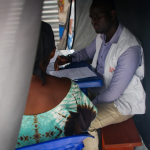
The international humanitarian organisation, Médecins Sans Frontières (MSF), has raised concerns about the critical situation regarding sexual violence in the Eastern Democratic Republic of Congo. They report that the support and treatment available for victims are still insufficient, while assaults against women continue to occur at an alarming rate.
In 2024, approximately 40,000 victims and survivors received treatment from the MSF team in the North Kivu province. This trend continued into 2025. Between January and April 2025, the organisation says it cared for around 7,400 people in Goma and over 2,400 in Sake, which is near Goma.
Despite changes in the security landscape, sexual violence continues to be a pervasive issue. “The context in the region has changed, but the problem of sexual violence persists, with women remaining the primary victims,” explains Francois Calas, the MSF chief in North Kivu.
The ongoing insecurity in these conflict zones contributes to the perpetuation of violence. Most recorded acts of aggression are committed by assailants wielding weapons, who are often not identified due to the presence of numerous armed groups and the widespread availability of firearms.
Organisations like MSF have condemned the worsening access to treatment, noting that many health facilities no longer have the necessary medications and supplies to treat victims. Ongoing conflicts disrupt supply chains, and a decrease in humanitarian funding further exacerbates the situation.
The revelations by victims who spoke to MSF indicate the brutality of the assaults and the absence of secure places for women, both displaced and those in their homes.
“Armed men entered our house around 22:30,” reveals Nasha, a displaced woman who found refuge in a school. “Some husbands [men] were killed and women raped. It was the case with me. Three men wanted to rape me in front of my husband and my eight children. My husband resisted, and they killed him.”
Around Goma and Sake, other victims report having been assaulted on the highway or on their farms.
“They asked me to choose between allowing them to rape me or death,” said Rika, an inhabitant of a village situated forty kilometres to the west of Goma. “They raped me one after the other.”
In South Kivu, the situation remains preoccupying. In the territories of Kalehe and Uvira, about 700 survivors have been taken charge of since January 2025. There, too, the assaults continue sometimes during displacement or near health structures.
“We have suffered on the farms where we sought refuge,” says an inhabitant of the hills around Kamanyola. “Armed men do not authorise us to go through villages. Some women have even been raped while trying to reach a health centre,” the woman added.
MSF insists that the figures given are below the real figures. According to Luders Leriche, medical coordinator of South Kivu, the fear of reprisals, stigmatisation, distance, and weakness of the health system prevent many victims from accessing medical assistance. The social and psychological consequences are hefty and include isolation, rejection, and thoughts of resorting to suicide. While the women are the principal victims, the men are also affected, though the number of cases reported remains less than those involving women.
The French humanitarian organisation calls for urgent mobilisation, saying: “Despite the present challenges, it is imperative not to abandon these women and children. Their being taken care of must be an absolute priority.”
In the provinces of North Kivu and South Kivu, MSF proposes comprehensive care for victims, including preventive treatment for sexually transmitted infections, urgent contraception, vaccinations, psychological therapy, secure abortions, and hospitalisation for more severe cases.
Emergency risks continue to escalate when civilian protection measures are not strengthened and access to treatment is not maintained. Therefore, MSF emphasises the need to sustain and enhance humanitarian efforts, prioritising the care of victims, even in the face of reduced global funding.
